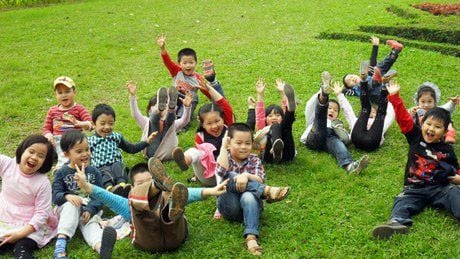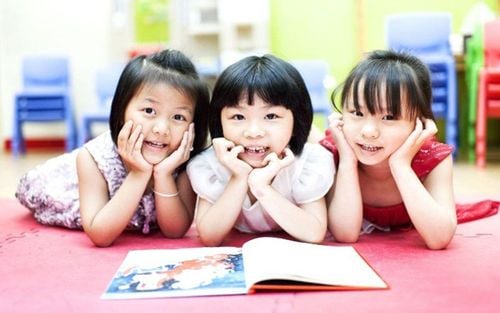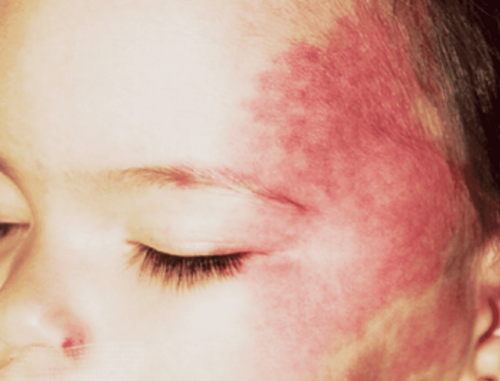This is an automatically translated article.
The period between the ages of 6 and 8 is one of the major cognitive changes for children. Children begin to have a change from kindergarten to adolescence, from a life dominated by imagination to a life that begins to be dominated by logic and reason. Children begin to see themselves as more autonomous individuals, with basic independent problem-solving abilities. When children begin to recognize the “right” way of doing things, they invest more time and energy in getting things done in the way they want.However, like preschoolers, children continue to prefer structured activities to risky activities and they continue to need consistent direction from adults. In this article we will provide useful information to help you better understand the social, cognitive and physical development milestones of 6-8 year olds.
1. Development milestones
1.1. Physical or motor development
Of all the aspects of development, physical development is the most obvious and easiest to follow. At this age you may notice your child has obvious physical changes such as:Replace the first baby teeth. Height increases from 4-6 cm. Sharp vision is as clear as an adult at this time, improving hand-eye coordination. Increase body awareness Develop more complex mobility skills, such as running in a zigzag, jumping down stairs, wheelchair running, and catching small balls. Children have the ability to combine gross motor skills such as running to kick a ball, skipping rope. These physical skills depend on how often your child practices them. Complex motor skills also develop, and your child can brush their teeth and do daily cleaning tasks on their own without your help. Your child can also write smaller letters on their school notebooks. Children can move and dance to the tune of the music more accurately. Another part of a child's physical development milestones is their health and nutrition. At school, your child's opportunities for physical activity and outdoor activities are reduced, and so is the risk of weight gain. Therefore, encourage your child to exercise regularly and enjoy outdoor activities. Get involved in sports together, explore new places with the family, ride bikes and make sure the whole family has a balanced diet and good health.
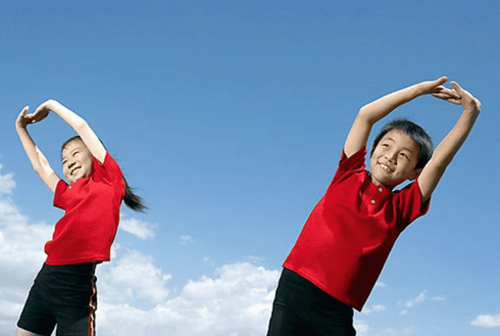
Bạn hãy khuyến khích con tập thể dục thường xuyên
1.2. Behavioral development
Behavior is an important factor that you need to pay attention to in children of this age. Right now, your child's life revolves around family, school, friends, and after-school activities.Your child's values and ethics are evolving and your child may share strong views on what is right or wrong. Children will also be more aware of what others are doing. This can lead to comparisons like “She can draw better than me”, “She dresses better than me” or complains about the sibling getting more things than the child.
Children are more independent, want to express themselves more, they may also enjoy helping adults with housework.
Behavioral milestones for children aged 6-8 years:
Enjoying company with friends and participating in conversations Interested in clothes and hairstyles. Enjoy telling jokes and talking about your child's skill or behavior. For example “You can eat 10 cookies at a time” Write numbers and words more accurately, but your child may still confuse some letters, for example, b/d and p/q. Have better reading skills than spelling Start to understand the value of money, enjoy counting and saving money. Better at distinguishing between fantasy and reality. There is a bit of understanding about gender.
1.3. Cognitive development
Children 6 to 8 years old can better understand cause-and-effect relationships. Children begin to see how their actions affect others, even though they still appear to be self-centered at times. For children to be able to perceive between right and wrong at this time is extremely important and requires the right guidance from parents and teachers.When it comes to cognitive development at this age, it is impossible not to mention the following:
Improve listening skills and the ability to follow instructions. Children's drawings will be more sophisticated and pay attention to details. Understands interrelated things and can articulate an issue coherently. Moving to abstract thinking, children can look at pictures and tell a story according to their rich imagination. Developing reasoning skills, you might be surprised when your 6-year-old reasoned with you about something. Memory is also improved and your child can group objects by size, shape and color. Children have a good understanding of numbers and can do simple math problems like addition and subtraction. There's a lot going on at this age, so don't be surprised if your child is easily distracted and forgets small requests and instructions from you.
1.4. Language and communication development
As your child turns 6 - 8 years old, they will do better with language and communication skills and develop the ability to speak clearly now. Children can use language to express their thoughts and feelings.Signs of language and communication development you may notice include:
Your child can say his or her name, age, date of birth, and where he lives. Understand general opposites, such as large and small, height, light and shadow... Using increasingly descriptive and detailed language, able to convey ideas clearly along with one's point of view own about everything. Discover the meaning of words, when they meet a new word, children will immediately ask you what the word means and enjoy learning new knowledge, then can apply what they have learned next situation. Children's writing ability is also better, holding a pen to write a paragraph is no longer difficult for children.
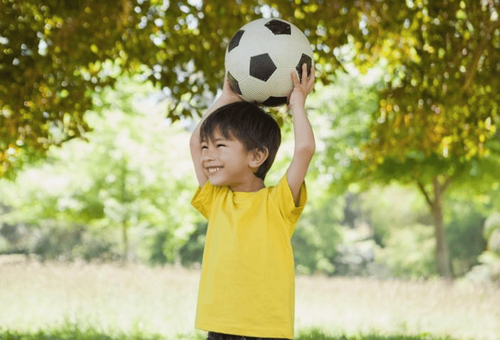
Trẻ có thể sử dụng ngôn ngữ để bày tỏ suy nghĩ và cảm xúc của mình
1.5. Social and emotional development
You will see your 6-year-old becoming more and more independent, but family is still the most important to them. Friends, new relationships outside of the family are also an integral part of children's lives during this period. Your child will show the following signs that you should be aware of:Socializing with others outside the family. Make new friends more and more easily. However, sometimes I also want to play alone without anyone bothering me. Continue to have fears like “monsters” and big animals. Understand the concept of sharing and know the importance of helping hands, or sometimes be jealous of siblings or other children. Have emotional stability and share your child's feelings with you. Pretend to play a variety of games with imaginary characters Pretend to be adults to younger kids. Develop a sense of humour.
1.6. Learning and educational development
As a 6-year-old child, I have officially entered the arduous learning path ahead of me. With a love of discovering new things, children can remember what she teaches in class when they are really interested and highly focused. Here are the abilities a 6 year old baby can do:The ability to read the clock properly. Can understand the lessons taught in school. Know the alphabets and numbers well. Adapt to getting up early and going to school every morning as a habit.
2. Advice for parents with children aged 6 - 8 years old
Support and encouragement from parents are what children always want to have at any stage of development. When a child knows that his parents are always by his side, he learns more and stays optimistic about everything. On the other hand, when you pay little attention to your child's needs, he or she may become insecure or disobedient. Here are some 6 - 8 year old parenting tips that you should know:Spend time playing with your child whether it's indoor or outdoor play. At this age, your child has grown physically and independently, thereby increasing the risk of accidents and injuries. Make sure you keep an eye on your child at all times so you can be prepared for any worst-case scenario. Build your child's self-esteem and confidence by recognizing their strengths and positive qualities. Sometimes children's self-esteem drops during the elementary years as they become self-critical and compare themselves to others. Let your child see you trying new things and making mistakes. This helps your child understand that learning and improving both involve making mistakes, but the key is to never give up. Absolutely do not compare this child with another, it will make them have a negative thought that they are always inferior to their peers, instead encourage them to share difficulties in learning as well as in life. Read a book with your child or give them a storybook and then discuss what's in the book or story together. This will help the child's literacy development. Encourage your child to be aware of the consequences of his behavior and to see things from the other person's point of view. You can do this by asking questions like, “How do you think you feel when you do that?”. Share opinions and discuss important issues with your child. This helps you connect with your child and shows that you care about their ideas, for example: take them shopping for an item and ask them for their opinion on what color to choose, which type... As your children get older, allow them to participate in family decision-making if appropriate. Talk to your child about treating boys and girls equally, and respecting girls and women. Understand the reasons behind your child's sadness and anger. Talk to your child whenever possible and offer solutions that can help them work through their negative emotions. Communicate more with your child. Ask them about school or how their day went. Communication can help you learn your child's likes and dislikes. Doing homework with your child, this can help you both test your child's knowledge and increase the bond between the two of you. If that's not possible, sit next to your child for peace of mind, or read a book while your child is studying so he or she can follow your example. Avoid setting too many rules at home, instead stick to the most important ones - like bedtime, politeness, and when your kids can watch TV, or eat sweets. As a parent you cannot be sure that you know everything about your child, you always need to learn more from other parents or older people. Don't be shy to talk about things you don't know or are concerned about.
You may feel frustrated, annoyed or overwhelmed at times. You can take some time off until you calm down. Try going to another room to take a few deep breaths or call a family member or friend to talk. Absolutely do not scold the child, because that will only make the problem worse.

Dành thời gian chơi với con bạn cho dù đó là trò chơi trong nhà hay ngoài trời
3. When do you need to worry?
If your child always seems anxious, depressed and sad. Child likes to play alone, refuses to socialize with others (autism) Has out-of-control thoughts and actions Shows irritable behavior and has trouble following instructions . Fighting at school and having a hard time making friends. Unable to write numbers and letters properly for a long time. Every child has different developmental milestones at different time intervals. If your child is at this age but does not have enough of the above signs of development, give him time, but if it is too long and he cannot keep up with the growth momentum or has unusual symptoms, you should take him to the doctor. .At this age, you should take your child to a medical facility for regular check-ups. This will help parents proactively protect their baby's health both physically and mentally. Currently, Vinmec International General Hospital has a general health examination program for children under 18 years old. With this package, the baby will receive a comprehensive examination from blood pressure, weight, height, ear - nose - throat, oral cavity, quantitative vitamin D, iron, calcium, vision test, abdominal ultrasound.. If the child has psychological problems, they will be examined with leading psychologists at Vinmec Psychological Clinic.
The medical team are all experienced, highly qualified, trained regularly and continuously with leading international experts. Modern medical equipment, completely imported from the US, Korea, Japan, UK, Singapore. If you have a need for a general health check-up at Vinmec, please register directly at the website right away or contact the hotline system for detailed advice.
Please dial HOTLINE for more information or register for an appointment HERE. Download MyVinmec app to make appointments faster and to manage your bookings easily.
References: babycenter.com, raisingchildren.net.au, parenting.firstcry.com, expatwoman.com



